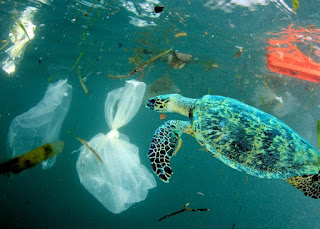One impact of the plastic bag waste I thought was interesting and hadn't thought about before is that plastic bags are made up of oil. I never took the time to think about how they were actually made and only makes up 4% of the natural gas and oil, which is a small percentage amount but still is a lot of oil. Instead of creating more plastic bags, we should reuse them because plastic bags take years to break down, about 400 to 1,000 years. The United States estimates to throw out roughly 100 billion plastic bags. Companies and stores are changing their kind of plastic bags customers are receiving while shopping is a promising way the use of plastic bags could go down. Personally, we should handle the plastic bag waste by not producing anymore plastic bags but instead the plastic bag company should find a way to reuse the plastic bags that were already created. By doing that customers of the bags need to be responsible and throw them in the right garbage. On the other hand, the environment is full of plastic bags and a solution to fix that problem is to create a clean up program and groups to clean up our communities. The plastic bag waste is a combination of national, global, and local problem and needs everyone to do their part to clean up the Earth. From a manufacturer point of view, plastic bags are misunderstood, yes, they take longer to be broken down but customers use other types of plastics that harms the environment as well. In conclusion, once the environment starts to be cleaned up and people have to start to realize the causes certain things it has to the environment. https://www.vox.com/2014/10/4/6901299/plastic-bags-environment
I recently made some tacos this past week for dinner. The ingredients I use when I make tacos is ground beef, taco seasoning, sour cream, lettuces, cheese, and sometimes black olives. Sour cream is made from light cream and contains no less than 19 percent milk fat. Sour cream is produced by adding a culture of Streptococcus lactic to pasteurized light cream and incubating at 72 degrees Fahrenheit until the desired flavor and thickness is reached. Tomatoes are commonly grow from seedlings started indoors that are later transplanted into the garden. They are planted indoors as early as 6 to 8 weeks before the average date of the last spring frost. Then they are transplanted into the garden 1 to 3 weeks after the last frost. Ground beef is processed meat, any meats that are not fresh. Processed meat has been modified from its natural state, either through salting, curing, fermentation, smoking, or other processes to enhance flavor or improve preservation. Since sour cream is made for...


Comments
Post a Comment